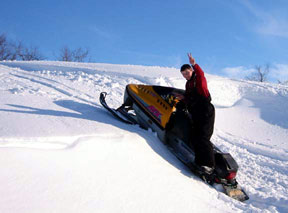Climate Change & Winter Tourism in the Great Lakes Region:
The Potential Impacts & What We Can Do
Climate change could affect the Great Lakes in ways that would have implications for the economy and quality of life in the region. Lake-effect snow occurs when cold Arctic air masses pass over the much warmer lakes in late autumn and early winter. The cold air is heated and moistened by the lakes. Much of this moisture is deposited as snow on the downwind lakeshores.
Lake-effect snowstorms can create transportation problems, widespread power outages, damage to buildings and human injury. On the other hand, lake-effect snowfall also supports and important winter recreational industry in some parts of the Great Lakes. Many of the Midwest´s premier downhill ski resorts are located in these downwind snowbelts. Also, snowmobiling has become one of the key components of winter tourism for much of northern Michigan, particularly the Upper Peninsula. Since the 1970´s, a significant snowmobile industry has developed including snowmobile dealers, resorts, snowmobile clubs, and a statewide system of trails and facilities. Snowmobiles are more sophisticated and expensive today and snowmobilers are more likely to use them on overnight trips away from home, which in turn supports lodging and restaurants.
Recent studies show that past changes in lake-effect snowfall were related to climatic shifts. The models indicate a decrease in the number of below-freezing days in the 21st Century. The amount of lake-effect snowfall has varied considerably in the past. Recent studies show that these past changes were related to climatic shifts. Thus, future climate change is likely to affect future snowfall amounts. Changes in the heavy lake-effect snow events were evaluated as part of the Great Lakes Regional Climate Change Assessment, as well as the increase in winter-time lake-effect rain events. This indicated large decreases in the frequency of such events, mainly because of a model-projected decrease in the number of days below freezing. The study suggested a corresponding increase in the number of winter-time lake-effect rain events. Abnormally light snowfall amounts during the winter season may have significant negative impacts for winter tourism industries. Climate Change and Winter Tourism in the Great Lakes: The Potential Impacts, and What We Can Do workshop will present the most current research findings from the Great Lakes Regional Climate Change Assessment. Representatives from recreational winter sports such as skiing and snowmobiling, as well as leaders from the business and tourism community. Panel discussions will follow, providing a forum for participants to discuss not only the potential effects of climate change on their lives and livelihoods, but also strategies to address these impacts.
Presented by:Great Lakes Regional Climate Change Assessment, National Wildlife Federation, U.S. Environmental Protection Agency, and Michigan State University |

Agenda (html / doc)
Speaker Presentations
Q&A Periods
Workshop Report (pdf)
Invitation or Flyer
Press Release
Co-Sponsors
Others (ex. video)
|